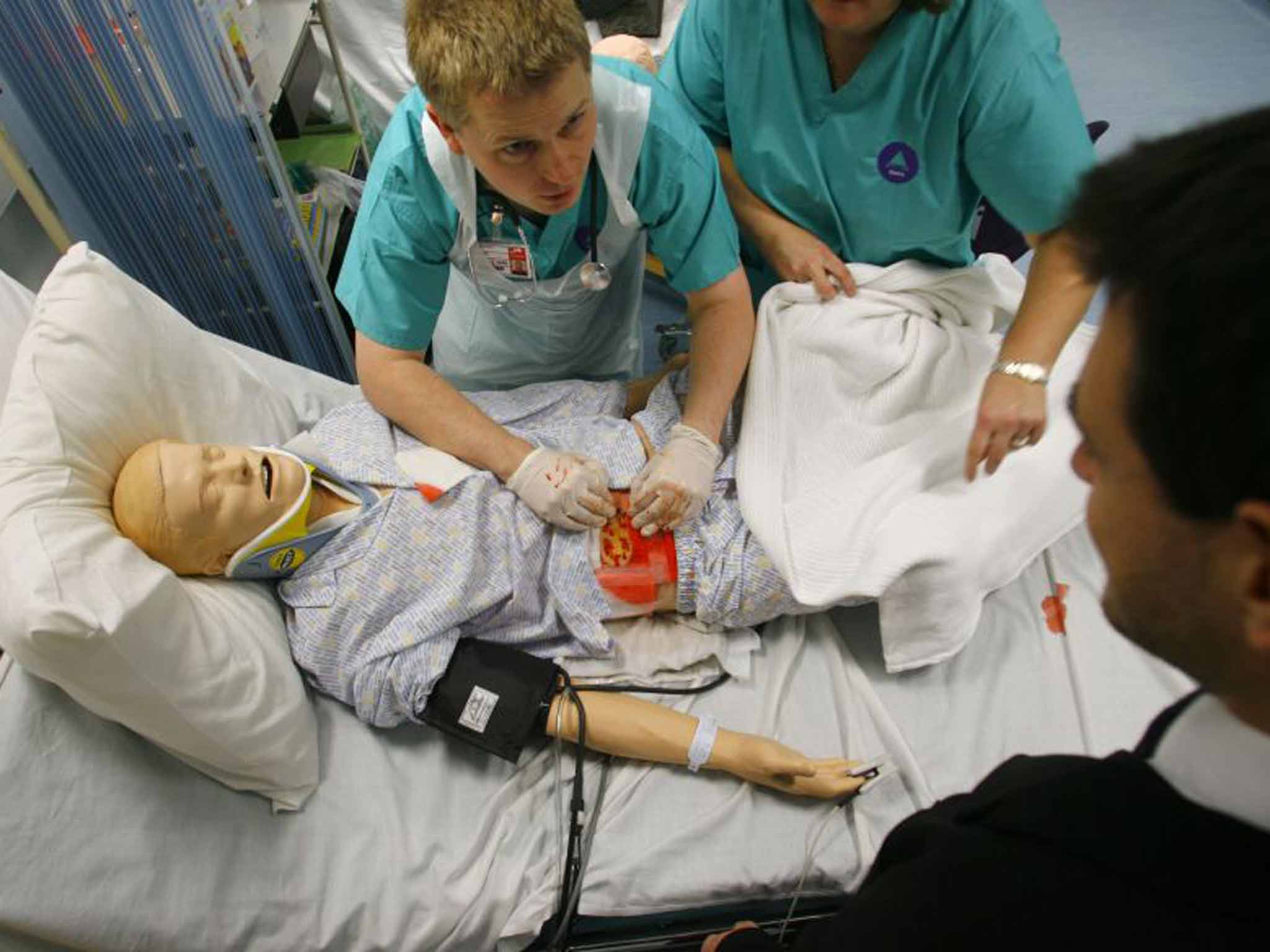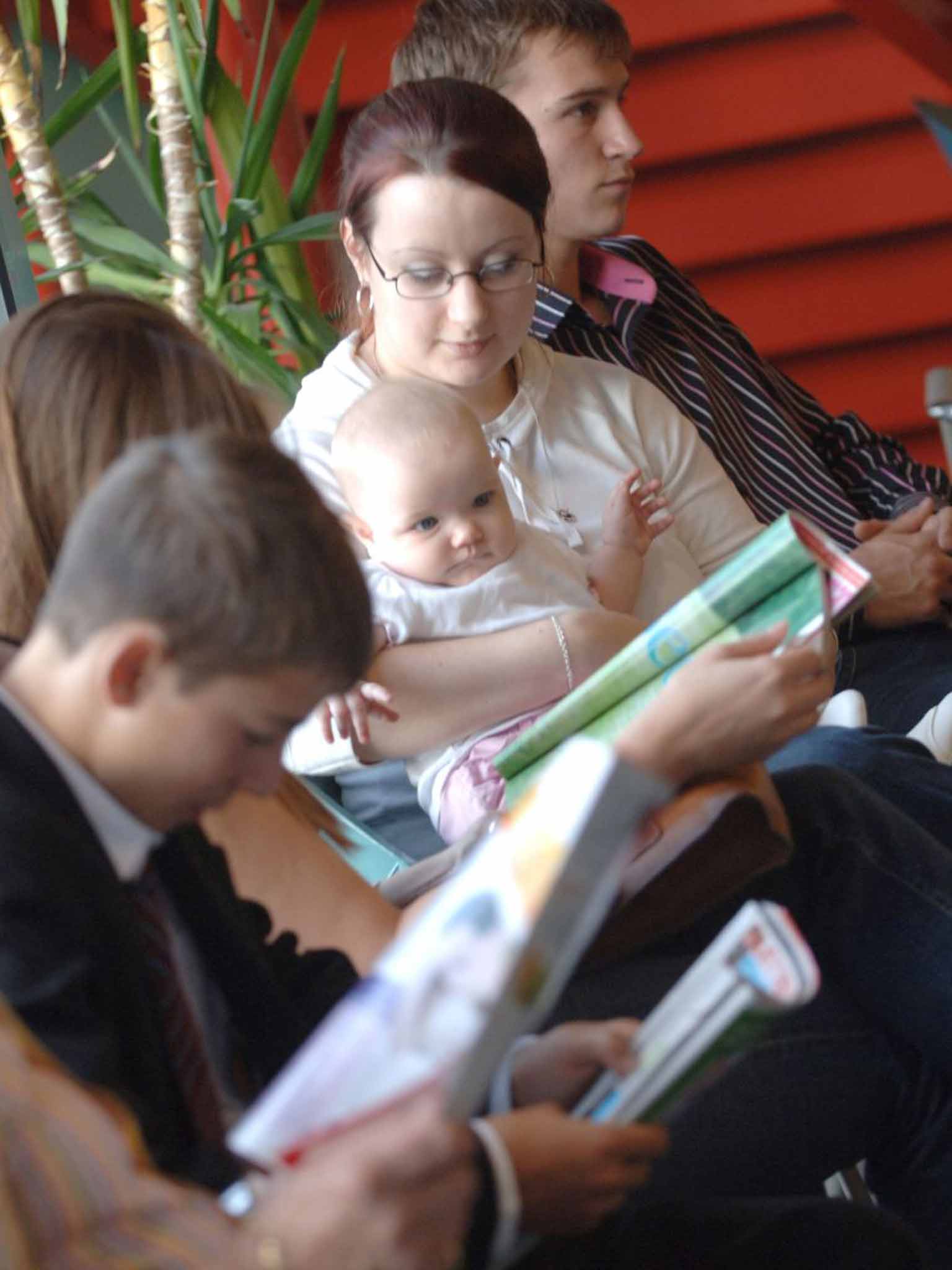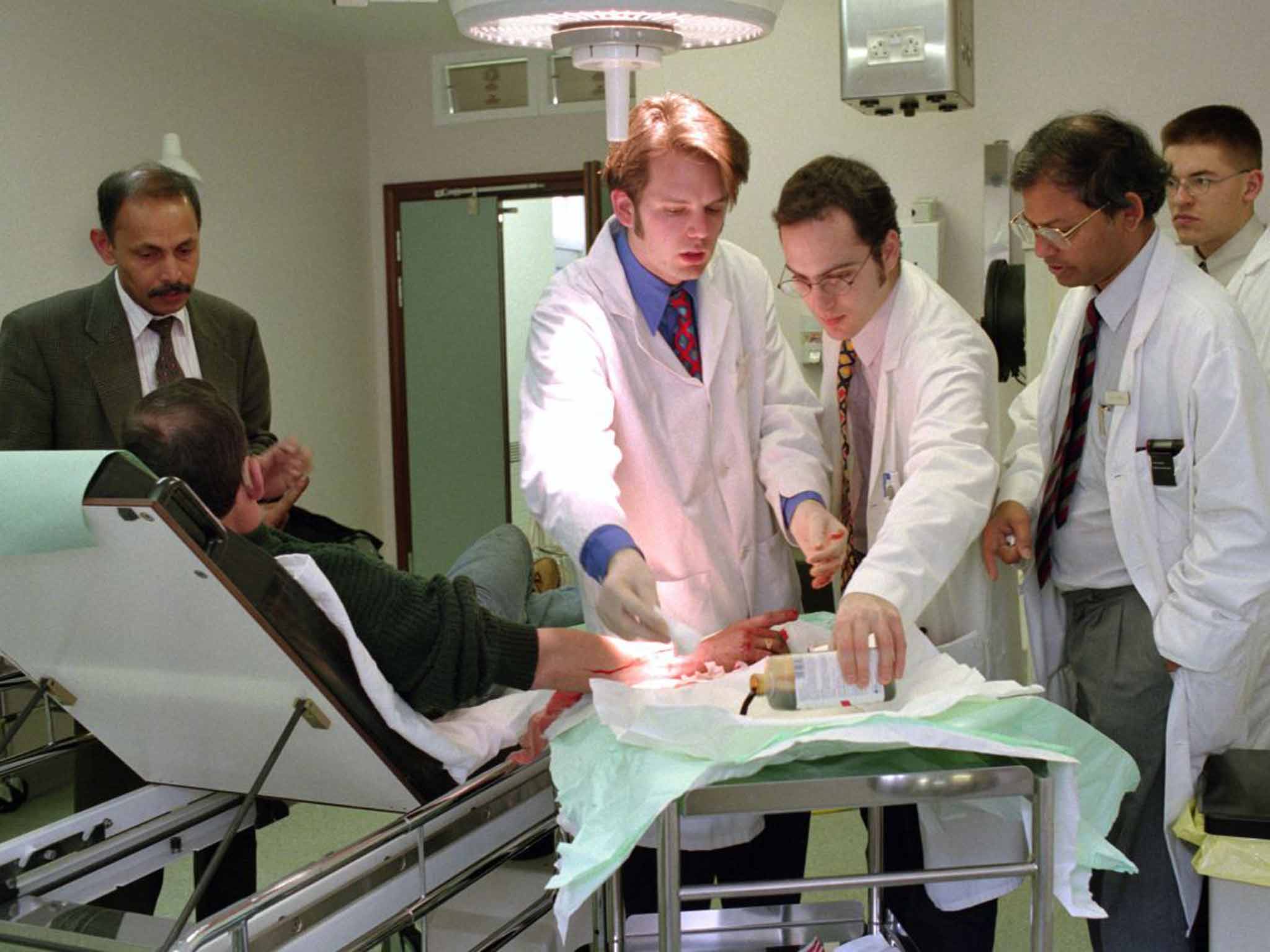The big NHS question: Why are there so few new GPs when so many of our keenest brains want to study medicine?
When scores of surgeries are closing, what hope for the PM's promise of 5,000 more GPs and a 24/7 NHS? Peter Stanford, whose son wants to be a doctor, says a system that turns away so many able students is already on life support

As last week's Queen's Speech made plain, David Cameron has the National Health Service firmly in his sights in the wake of his election victory. He's been busy, since 7 May, wandering round hospitals with his tie tucked into his shirt, talking up his plans for a seven-day-a-week NHS, with consultants on hand at weekends for routine appointments, and the promise of 5,000 new GPs to be recruited.
However, as The Independent's front page also made plain yesterday, Cameron has a mountain to climb. GP numbers in Britain aren't even stable but falling; scores of surgeries have closed in the past two years, and hundreds of thousands of patients have been forced to re-register elsewhere. This has been caused by a toxic combination. More and more experienced doctors are either taking early retirement or going into private practice, while the system is not producing enough new doctors, and many of those who do qualify have no desire to enter general practice.
So, while Cameron's theory is hard to fault – especially when so many of us wait for days, if not weeks, for a routine appointment at our local surgery – what is the reality? Why have we reached what Dr Chaand Nagpaul, the chair of the GP Committee of the British Medical Association (BMA), called "the brink of collapse"? And how can we rectify it – if, indeed, we can?
Dr Nagpaul's attitude is typical of the scepticism about Cameron's promises that's found in the medical establishment. "Now the election is out of the way," he recently told a doctors' conference, "I call upon the Prime Minister to jettison the political pipe dreams of tomorrow and get real about how we resource, resuscitate and rebuild general practice today."

By getting real, he means addressing how the NHS is to cope with a Government re-elected on a ticket of more austerity that includes finding £12bn of "efficiency savings" in the NHS.
My own perspective on this ongoing debate is shaped by having spent the past 12 months as a (hopefully supportive) parent of an 18-year-old doing A-levels who wants to study medicine and one day join the medical profession. When he first announced his plans to become a stethoscope wearer, I was torn between pride – I come from the generation raised to regard men and women in white coats with the sort of reverence otherwise reserved for World Cup winners – and worry that he wouldn't make the grades. But, as the months have ticked by, my strongest feeling has been to wonder what sort of NHS will await him if, in seven or eight years, he finally manages to qualify.
First things first, though. It is hard to get a university place for medicine, and getting harder. Medicine degrees at UK universities now have 11 applicants for every place (up from nine in 2008). Such numbers might be taken as a vote of confidence that the NHS is safe in Tory hands, but also playing a big part are the effects of the recession and changes in university funding that make degrees directly linked to professions so attractive.
Ucas – the universities' admission service – reports that in 2013 there were 84,395 applications for medicine and just 7,515 places. Many of those rejected opted for other associated subjects, but there were plenty who simply fell by the wayside. Of the 4,800 students with straight As at A-level who failed in 2013 to get a place anywhere, 1,800 had applied for medicine, 930 of them women.
Lesson one that I have learnt over the past year is that getting started in studying to be a doctor is a brutal process that chews up fragile 18-year-old enthusiasms and egos. Most of those who don't succeed are too bloodied by the experience to speak out – or plan on trying again next year so have to keep schtum. But Shayo Oshodi, a pupil at Headington School in Oxford, did speak out after being rejected for medicine by four Russell Group universities despite being predicted A* grades at A-level and having an impeccable track record of work experience.
"I found it incredibly frustrating. And I wasn't the only one; others, too, were left thinking, 'What have we done wrong?' We were told that it was down to the high volume of strong applications, but that's still difficult for people to take when they have been studying for years with a view to doing medicine."
Perhaps that is how it has to be. After all, the successful few are entering a profession where they will need a certain toughness in dealing with matters of life and death.
Yet my second lesson has been that I struggle to discern any sort of logic in our current recruitment system for the doctors of tomorrow. Or to make a practical connection between it and the promises being trotted out with such fluency by David Cameron about doctor numbers in the future.
Already, we have one of the lowest levels of doctors per head of the population in the European Union. At present, the UK has 2.71 practising doctors per 1,000 people. That ranks us 24th out of the 27 EU nations.
Over the past 12 months, much of what I've observed at medical schools is admirable, especially their thoroughness in going about the near-impossible task of selecting an intake from the tide of well-qualified teenagers that annually all but swamps them. Admissions teams devise additional written papers and craft finely calibrated interview processes in an attempt to pick out both the most able and the most suited to the challenges the medical profession faces going forward.
Particularly reassuring as a user of NHS services are the medical schools that make plain they want to produce doctors with "human" skills of empathy and interaction rather than just a bevy of geeky scientists who can score top marks in every test going but would no sooner look you in the eye than put the digital point in the wrong place during a calculation.
Yet academics involved in the process believe their efforts are in vain because they are just overwhelmed by suitable candidates. "We might as well start picking names out of a hat," one disillusioned admissions tutor confessed to me privately, confronted with around 5,000 applications for her 200 places. "We all know that would go against every principle of rewarding educational achievement, but frankly I am beginning to wonder what alternative we have."
So, in the most basic terms, Britain has too many people wanting to study medicine, but too few doctors emerging at the end of the process to maintain NHS services. Surely that's hardly a conundrum? Simple answer: recruit more undergraduates on to medicine courses at 18.
But that would require the consent of the politicians, since places to study medicine are part-funded by the NHS at a cost to the taxpayer of around £175,000 per head. And politicians tend to be interested only in fixes that will bear fruit before the next election, which will arrive before any new entrants even emerge from stage one of their training.
"It is absurd," Dr Nagpaul says, "for political parties to outbid each other on the number of GPs they could magically produce. Since it takes five to eight years to train a GP, it is not possible to create thousands of GPs in this time frame. These pledges blindly ignore the current recruitment-and-retention crisis."

BMA figures show that, even if Cameron does somehow manage to come up with the promised 5,000 new GPs by 2020, they will cover only half the vacancies caused by existing local doctors who are planning to retire over the same period.
And how exactly is he planning to entice those now in the midst of medical training to opt to be GPs? That brings me on to lesson three. All applicants for medicine places at university must make the right noises about being a GP, even if they don't mean it. The really canny will include, in the obligatory list of work placements, details of shadowing doctors in a GP surgery.
Yet last year, the BMA reports, there were 451 empty places on the specialist GP training courses that medical students opt in to after they have completed their first five years at university and their next two "foundation" years in a hospital. Around 30 per cent of GP training places across the UK remained empty following the first round of recruitment, with the worst-affected areas seeing vacancy rates of up to 65 per cent.
"One of the big issues," says Valerie Kirwan of the BMA, "is that some areas of medicine, including general practice and acute medicine [A&E], are less attractive for trainees. This is largely down to difficult working conditions – long, antisocial, intense hours. All are areas that already have a recruitment-and-retention problem, so the pressure on existing staff is high. It's important to address these underlying problems, which are often linked to lack of funding and resourcing, if we are to ensure we can attract and retain the right mix and number of doctors to different parts of the NHS."
That will require some uncomfortable questions about deep-rooted problems, plus tough, unpopular decisions, none of which at present seems likely to come from our grandstanding political leaders. But to this amateur observer, one simple way of making progress in building up the numbers of GPs might be to fit some of those 1,800 straight-A students who were turned down to read medicine in 2013, into the holes that are currently opening up in local doctors' surgeries.
How about a separate GP training scheme that starts at 18, and is run alongside traditional medicine courses? The medical profession isn't keen. It would stifle choice, it says, and place a straitjacket on careers.
"There are, as far as we are aware," says Edward Knight of the Medical Schools Council, "no discussions currently taking place along those lines, but UK medical schools would like the UK to educate sufficient doctors for its own requirements. The number of medical students is determined by balancing future workforce planning against several factors, not least the cost of training, and who teaches the students, with assurances over the supply of clinical academics required in order to match the future student population."
So money and teachers are the practical obstacles. Neither seems an insurmountable obstacle if there were a will genuinely to try to resolve what the BMA itself keeps referring to in the context of GPs as a "recruitment crisis".
And, despite the reservations about offering "narrow" careers, I can't help wondering what some of the "unplaced" 18-year-olds, thwarted in their desire to be doctors, might say if they were offered the chance. If medicine is their calling, but they are currently being excluded, then here's a potential way in. There could even be a bridge built further down the line for those who want to transfer out of the GP training stream into the more general medicine set, and vice versa.
It could, of course, be argued that there is no need for such a bold step, that the current system for turning out 8,000 new doctors from UK medical schools each year does actually work. It is just that there are distortions between different disciplines, with specific shortages in GP recruitment, and in A&E and geriatrics, offset by surpluses elsewhere.
In this scenario, it is just a question of ironing out a few bumps within the system. But how, in that case, to reconcile such a contention with the fact that in December 2014, 97,910 of the 267,000 doctors on the General Medical Council (GMC) register of those doctors active in the UK had obtained their primary medical qualification outside the UK? That amounts to 37 per cent of all doctors here who have not trained in a UK medical school. Of them, around 29,000 come from EU countries. The four most popular places among the rest are India (25,000), Pakistan (9,700), South Africa (5,300) and Nigeria (4,100).
Now, I am not channelling Nigel Farage and suggesting we shouldn't permit any overseas-trained doctors in our NHS because it "forces out" home-grown talent. From its inception in 1948, the NHS has benefited hugely from the skills of large numbers of doctors who have done their training in the Indian subcontinent and elsewhere. In recent years, the GMC has worked hard to update regulations that require all doctors from outside the UK to meet certain globally recognised standards, including in the English language.
But it can't be dismissed as a non-issue. There have, for example, been evidence-based concerns raised about the professional standards of some overseas doctors. In 2012, the GMC reported that in the previous five years, 63 per cent of the 669 doctors struck off or suspended had been trained abroad. Meanwhile, a 2013 joint research paper from University College London and Cambridge posed questions over a "performance gap" between home-grown and overseas doctors in the NHS, with the latter often doing less well in examinations to enter professional bodies such as the various royal colleges.
Many other factors may be at play here, including age-old prejudices, yet, while diversity in NHS doctors is in many ways something to celebrate – it reflects the diversity in British society as a whole – it also raises questions as to how the current numbers of undergraduate medicine places are centrally calculated in one of the very few academic disciplines where there is still an official cap on students that can be taken on. Do the government planners factor in that a good quarter or more of all future requirements for doctors can be met by overseas-trained doctors?
If I were controlling an NHS budget that had to find £12bn in efficiency savings, I would be very tempted by the thought that I could rely on welcoming in a large number of doctors without having to shell out £175,000 per head to train them. My suspicion was reinforced recently by a senior A&E consultant who, when I asked why the NHS relied so heavily on overseas-trained doctors when there are so many well-qualified candidates from British schools being refused places to read medicine, just smiled and rubbed his fingers together. "We're getting doctors on the cheap, and that's the dominant philosophy in the NHS right now. Do everything as cheaply as possible."
If that really is the core approach, it holds out very little hope of better days ahead for the 10 in 11 who don't get a place to read medicine. Indeed, the ratio of places to candidates may go even higher.
And what hope for 5,000 new GPs by 2020? The final lesson that this would-be doctor's dad has learnt is that Cameron's diagnosis of the NHS's problems requires a second opinion.
Join our commenting forum
Join thought-provoking conversations, follow other Independent readers and see their replies
Comments